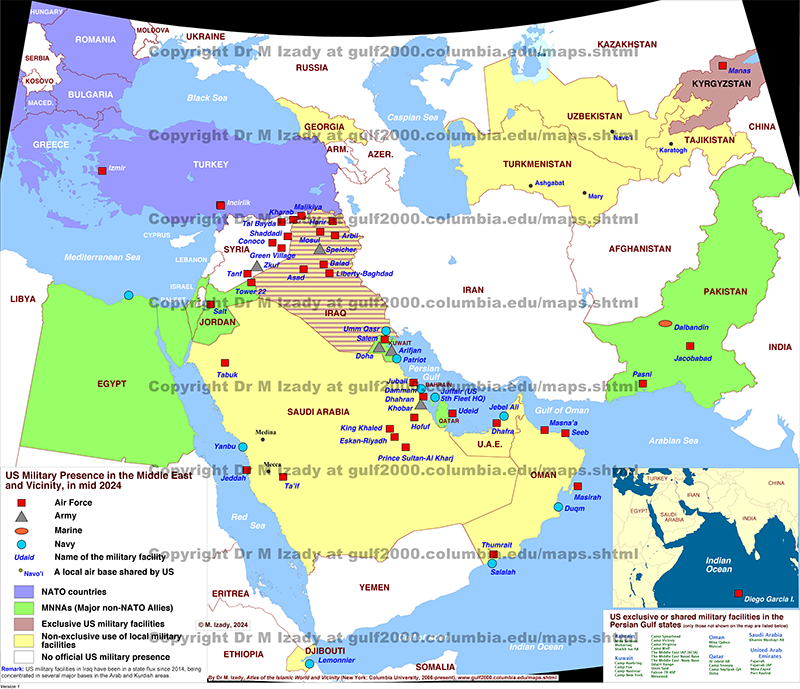US Military Bases and Facilities in the Middle East and Vicinity, mid. 2024
Years:
Map: US Military Presence in the Middle East and Vicinity (mid-2024)
Source: Prof. Dr. Mehrdad R. Izady, Gulf2000 / Columbia University.
Abstract
This narrative restates—purely for accessibility and SEO—what is visible on the sheet: service icons (Air Force, Army, Marine, Navy); facility categories (exclusive U.S. sites, non-exclusive/shared local facilities, local facilities with no U.S. presence); and host-country classes (NATO, MNNA). No off-map information is introduced.
1) Coverage and Date
The map is dated mid-2024 and spans the Eastern Mediterranean, the Gulf, and the Arabian Sea, with an inset for the northern Indian Ocean that highlights Diego Garcia.
2) Legend and Symbology
- Service icons: Air Force, Army, Marine, Navy.
- Facility categories: exclusive U.S. facilities; non-exclusive U.S. use of local facilities; local facilities without U.S. presence.
- Country classes: NATO members and Major non-NATO Allies (MNNAs) coloured distinctly.
3) Labeled Sites by Area
Major labels include:
- Turkey (NATO): Izmir, Incirlik.
- Iraq: an annotated corridor with Erbil, Al Asad, Balad, Baghdad, and adjacent sites.
- Jordan (MNNA): Salt, Tower 22.
- Kuwait (MNNA) & Bahrain (MNNA): clusters along the northern Gulf.
- Qatar (MNNA): Doha / Al Udeid.
- United Arab Emirates: Al Dhafra, Jebel Ali, Fujairah / Khor Fakkan, plus additional nodes.
- Oman: Seeb, Masirah, Thumrait, Salalah.
- Saudi Arabia: Prince Sultan – Al Kharj, Eskan, King Khaled, Tabuk, Yanbu, Jeddah.
- Djibouti: Camp Lemonnier.
- Inset: Diego Garcia.
4) Functional Pattern
- A dense air-access network spans the Levant, the Gulf, and the Arabian Sea.
- Naval nodes concentrate at chokepoints such as Bahrain, Jebel Ali, Fujairah, and Djibouti.
- Exclusive versus shared facility use is distributed across Gulf and Arabian Sea littorals.
Attribution: All statements derive solely from the map image by Prof. Dr. Mehrdad R. Izady (Gulf2000 / Columbia University).
